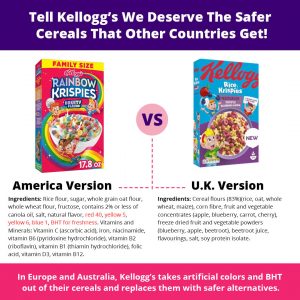Kicking Kellogg’s Out Of Our Schools: Prioritizing Healthy, Organic Food for Our Students
On October 15 over a thousand of us marched and delivered over 400,000 signatures to Kellogg’s HQ in Battle Creek Michigan demanding they remove BHT and dyes. Unfortunately, Kellogg’s would not meet with key stakeholders, parents, doctors, dentists, politicians, kids, food activists, and concerned citizens.
 We need to escalate this campaign to the next level. Consider the following 7 actions online and locally:
We need to escalate this campaign to the next level. Consider the following 7 actions online and locally:
- Share our content under the #CancelKelloggs hashtag to make more people aware. I have a lot of content from the event in my Instagram story highlights here.
- Tag, comment, save, and get active on our social media profiles.
- Message your state representatives and senators today. Many of them are working on legislation but many need to know about your concerns immediately.
- Sign the Food Babe petition here. Become one more voice in over 400,000 to help us escalate the message.
- Message celebrities, influencers, media outlets, and more to cover this information.
- If you own Kellogg’s take it back and tell the cashier you want the same cereal they serve in Canada without BHT and dyes. If you are invested in Kellogg’s, DIVEST today!
- Write a letter to your school board using our template below:
Dear [School Board Member(s)],
I am writing to express concern about the food currently being provided in our district’s schools. Brands such as Kellogg’s and other processed food companies supply products that contain artificial additives, dyes, BHT, high levels of sugar, and harmful chemicals of concern. Research (sources listed below) has shown that these ingredients can negatively affect students’ health, behavior, and academic performance.
As a community that values the well-being and success of our children, it is essential to shift toward healthier, more organic food options in our school meal programs. Prioritizing whole, organic foods—free from toxic pesticides, synthetic preservatives, and artificial dyes—can promote better focus, energy levels, and overall health for our students.
We ask that you work with local farmers, organic suppliers, and nutrition-focused partners to find alternatives to highly processed foods. By making this change, our district can set a powerful example, fostering healthier habits and demonstrating our commitment to the future success of every child.
Thank you for your leadership and for considering this important request. I look forward to your response and am happy to help explore solutions that align with our shared goal of nurturing thriving students and communities.
Sincerely,
[Your Name]
[Your Contact Information]
[Optional: Affiliation/Organization, if applicable]
 Here are three credible sources supporting the statement that certain food additives can negatively affect students’ health, behavior, and academic performance:
Here are three credible sources supporting the statement that certain food additives can negatively affect students’ health, behavior, and academic performance:
- American Academy of Pediatrics (AAP) – The AAP released a report highlighting the potential risks of food additives, including artificial colors and preservatives, which have been linked to adverse effects on children’s health, behavior, and development. The report suggests that some food additives can affect endocrine function, leading to behavior issues and developmental delays.
- Center for Science in the Public Interest (CSPI) – The CSPI has published extensive research on the effects of artificial dyes, particularly noting the link between synthetic food colorings and hyperactivity in children. These behavioral changes can impact focus and academic performance, especially in students with conditions like ADHD.
- The Lancet – A well-known study published in The Lancet demonstrated that artificial food colorings and preservatives can increase hyperactive behavior in children, which may contribute to challenges in school, affecting their focus and learning capacity.
These sources provide credible evidence linking food additives to negative effects on children’s health and academic performance.



